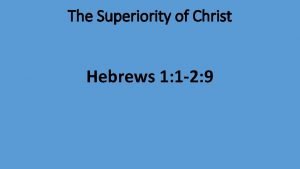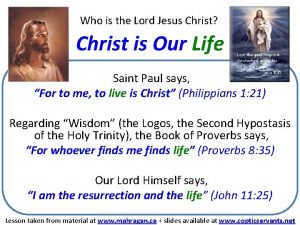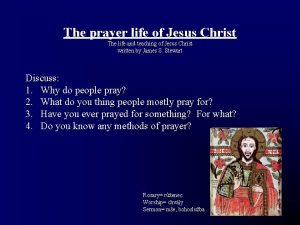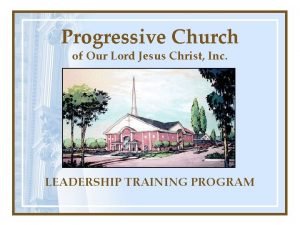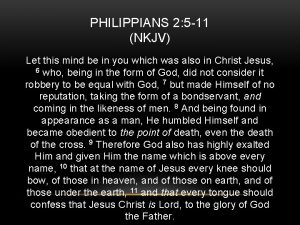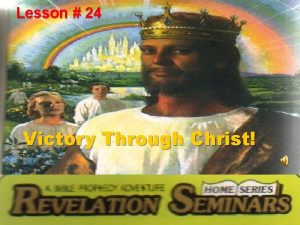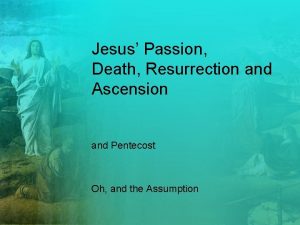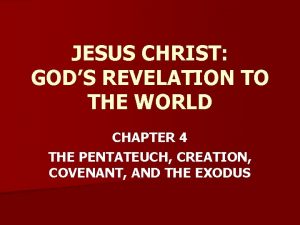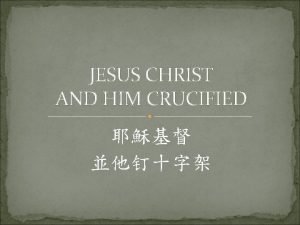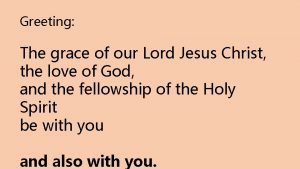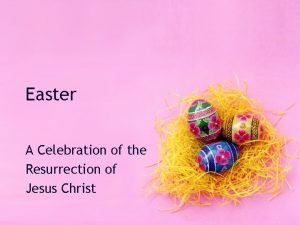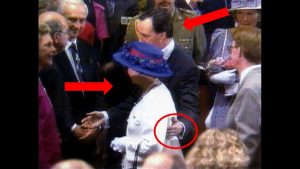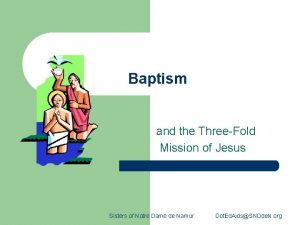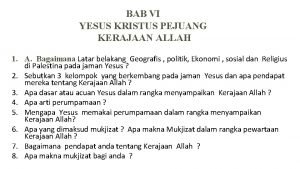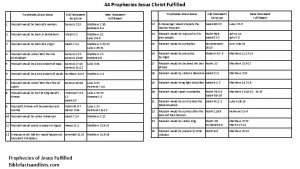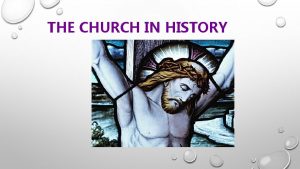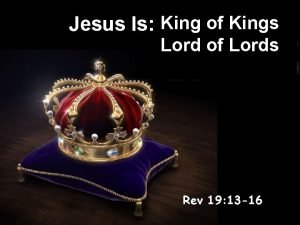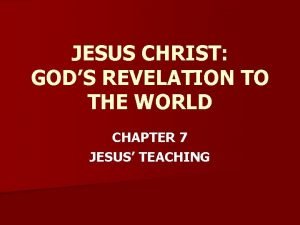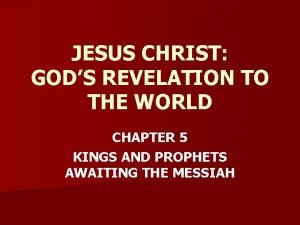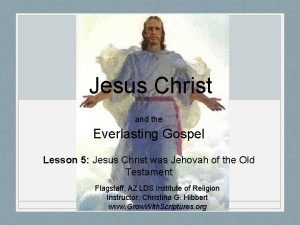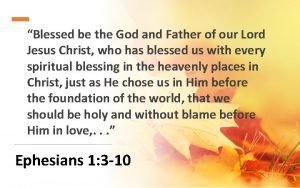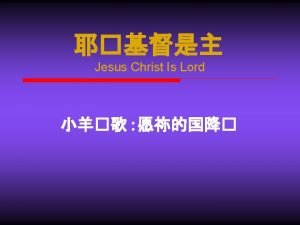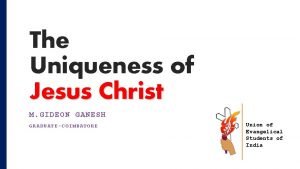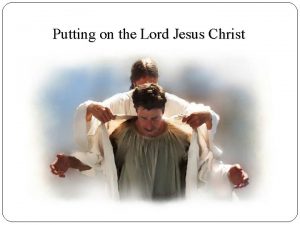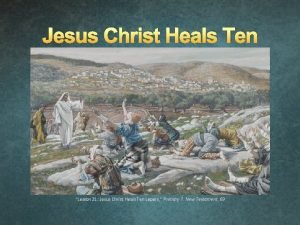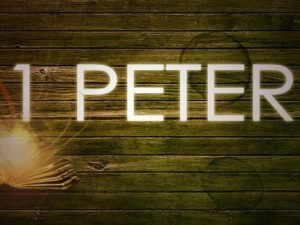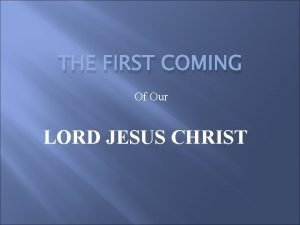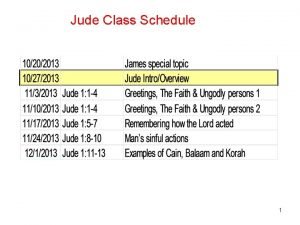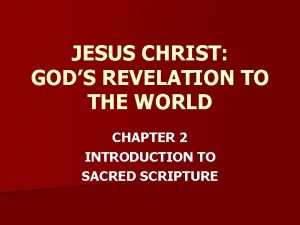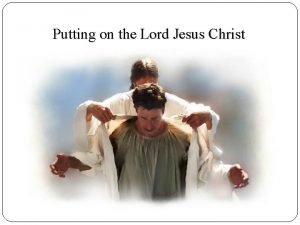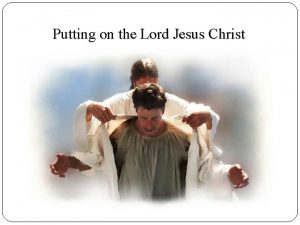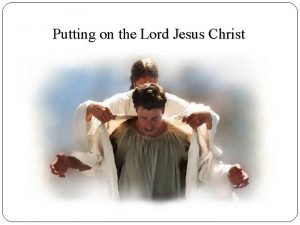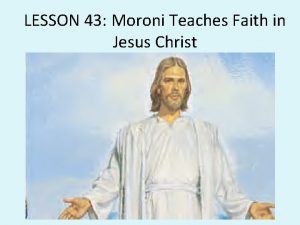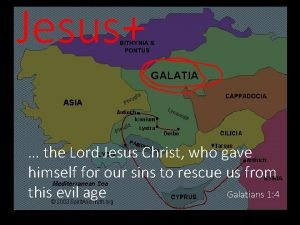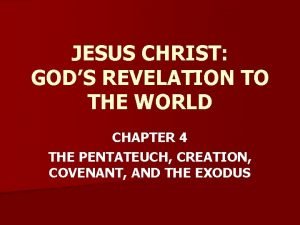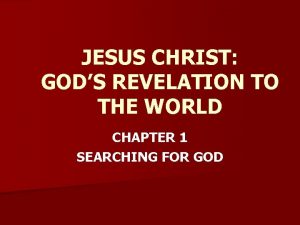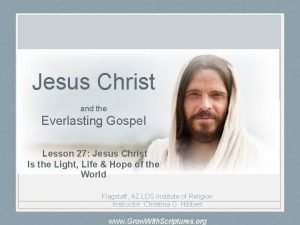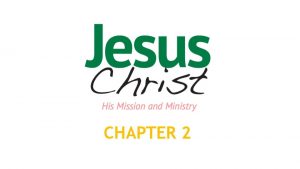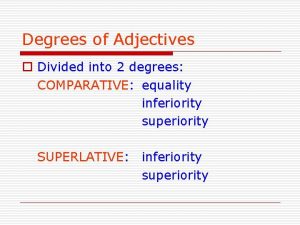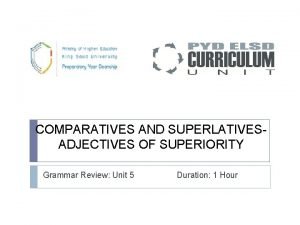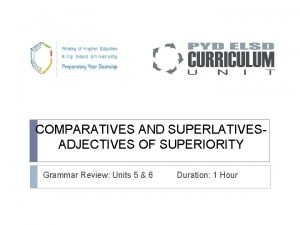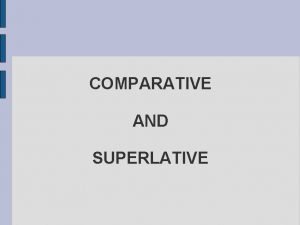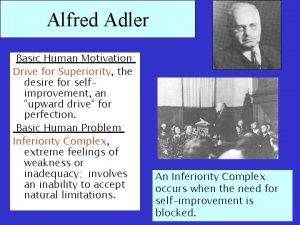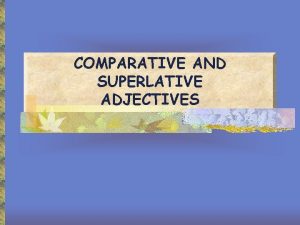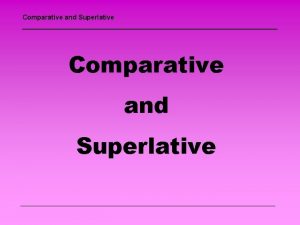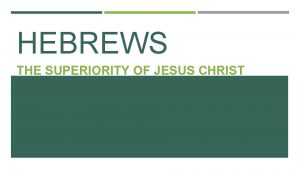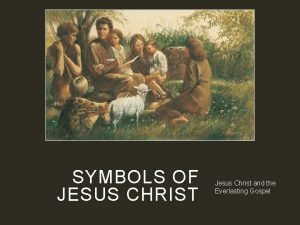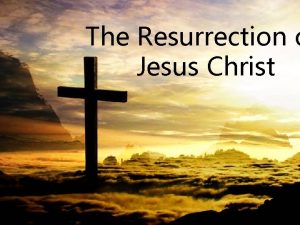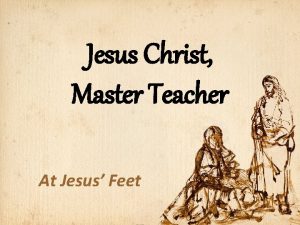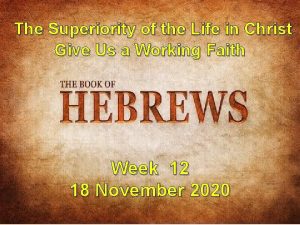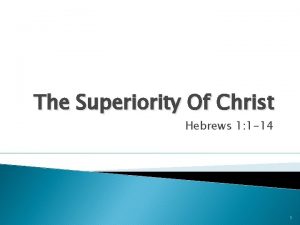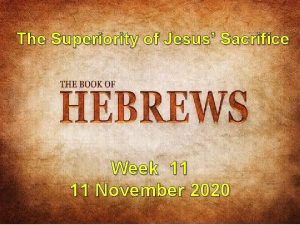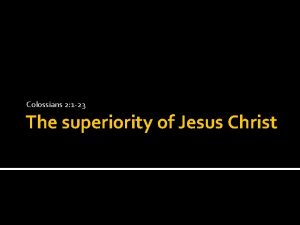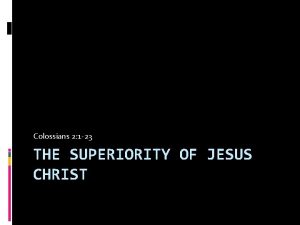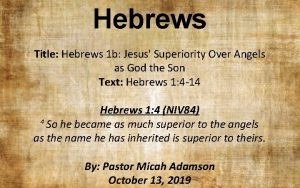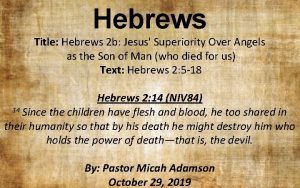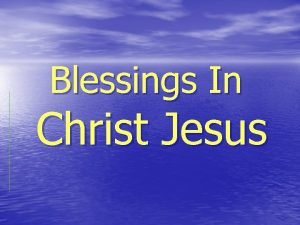Section Three The Superiority of Jesus Christ to















































































- Slides: 79

Section Three - The Superiority of Jesus Christ to Moses, as an apostle & leader Heb. 3: 1— 4: 13 I. Christ’s superiority to Moses, 3: 1 -6 A. The comparison of the two, 2 -6 a 1. Both are faithful, v. 2 1 Therefore, holy brethren, partakers of a heavenly calling, consider Jesus, the Apostle and High Priest of our confession; 2 He was faithful to Him who appointed Him, as Moses also was in all His house.

1 Therefore, holy brethren, partakers of a heavenly calling, consider Jesus, the Apostle and High Priest of our confession; • therefore - hothen - for which reason, wherefore, on which account • Since Jesus is greater than the angels as lawgiver & Savior, we should consider His greatness. • Holy brethren - hagios - sacred, holy: of persons whose services God employs • Hebrew Christians are addressed as brethren of the writer. • They are set apart from the world & dedicated to God by Christ like the writer. • They confessed believe in Christ, left the world & put on Christ in baptism, Gal. 3: 27. • They especially belong to God as His servants.

1 Therefore, holy brethren, partakers of a heavenly calling, consider Jesus, the Apostle and High Priest of our confession; • partakers of - metochos - sharing in, partaking of • the heavenly - epouranios - of heaven; made (by God) in heaven • calling - klēsis - a call, invitation; the divine invitation to embrace salvation in the kingdom of God, made through the preaching of the gospel • They are enjoying with others the state God in heaven invited them into. • They enjoy the benefits of God’s gospel invitation. • The call comes from heaven, leads to heaven, & fills one with heavenly joy. Phil. 3: 14

1 Therefore, holy brethren, partakers of a heavenly calling, consider Jesus, the Apostle and High Priest of our confession; • consider - katanoeō - consider attentively, fix one's eyes or mind upon • Meditate carefully & profoundly on the nature & character of Jesus • Think of His divinity, humanity, sufferings, death, burial, resurrection, ascension, glorification, dominion, love, sympathies, attributes, perfections

1 Therefore, holy brethren, partakers of a heavenly calling, consider Jesus, the Apostle and High Priest of our confession; • Apostle - apostolos - a delegate, messenger, one sent forth with orders; the apostle whom we confess, of Christ, God's chief messenger, who has brought the heavenly calling, as compared with Moses, whom the Jews confess, • Christ was sent by God for the redemption of mankind. 1 Jn. 4: 14 We have seen and testify that the Father has sent the Son to be the Savior of the world. Mal. 3: 1 “Behold, I am going to send My messenger, and he will clear the way before Me. And the Lord, whom you seek, will suddenly come to His temple; and the messenger of the covenant, in whom you delight, behold, He is coming, ” says the LORD of hosts. • Moses was sent to redeem Israel, Ex. 3: 10 “come now, and I will send you”

1 Therefore, holy brethren, partakers of a heavenly calling, consider Jesus, the Apostle and High Priest of our confession; • High Priest - Christ was greater than Aaron at making atonement & in every respect. • of our confession - homologia - same + speak - an agreement, profession, confession; subjectively: our confession i. e. whom we profess (to be ours), affirm our faith in or allegiance to • God made know the fact about Christ & the New covenant & we confessed that we believed & accepted the God plan. • Matt. 16: 16, 17; 1 Tim. 6: 12; Matt. 10: 32

2 He was faithful to Him who appointed Him, as Moses also was in all His house. • faithful - pistos - trusty, faithful; faithful in the transaction of business, the execution of commands, or the discharge of official duties • Jesus has always been faithful to God who appointed Him as Apostle & High Priest. • God appointed Him - poieō - made, created, produced: of God, as the author of all things • He continues to do the will of God as He did it on earth, Jn. 4: 34 • God says Moses was faithful, did his duty, as a servant in God’s family, Israel, Num. 12: 6 -8 • house - oikos - by metonymy, the inmates of a house, all the persons forming one family, a household: the family of God, the church of the Old & New Testament • God says all My house, Num. 12: 7

I. Christ’s superiority to Moses, 3: 1 -6 A. The comparison of the two, 2 -6 a 2. Christ is worthy of more honor: A builder is greater than the house built, 3, 4 3 For He has been counted worthy of more glory than Moses, by just so much as the builder of the house has more honor than the house. 4 For every house is built by someone, but the builder of all things is God.

3 For He has been counted worthy of more glory than Moses, by just so much as the builder of the house has more honor than the house. • Jesus is infinitely greater than Moses. • Mose was faithful in the house - Jesus built the house. • Jesus was the builder of the house of Israel & Moses. • He worthy of - axioō - to judge worthy, deem deserving • more - polus - much, many, weightier, greater • glory - doxa - good opinion, praise, honor • honor - time - valuing, a price; honor, respect • He is God & the builder of all things, Heb. 1: 2; Col. 1: 16 -18; Jn. 1: 1; 1 Cor. 10: 1 -3 • Jesus built & furnished the house. He is over anyone in the house.

4 For every house is built by someone, but the builder of all things is God. • Israel was a house & someone had to build it. • God, including Father, Son & Holy Spirit build Israel & the universe. • A design always implies a designer • The building of a family or house implies a chief architect • Jesus is divine & human in nature. • Much superior to Moses. • Jesus should not be spoke of as merely a man. • He is the Creator of all things including Israel.

I. Christ’s superiority to Moses, 3: 1 -6 A. The comparison of the two, 2 -6 a 3. Moses - faithful as a servant in a symbolic house Christ - A son over the real house, 5, 6 a B. Christians are part of that household if they hold fast, 6 b 5 Now Moses was faithful in all His house as a servant, for a testimony of those things which were to be spoken later; 6 but Christ was faithful as a Son over His house--whose house we are, if we hold fast our confidence and the boast of our hope firm until the end.

5 Now Moses was faithful in all His house as a servant, for a testimony of those things which were to be spoken later; • Moses was a servant - therapōn - retainer; an attendant, waiting-man, devotee: of God, spoken of Moses discharging the duties committed to him by God • He served as one of the Old Covenant people as a part of the types & shadows teachings that pointed to Christ & the church. Col. 2: 17; Heb. 10: 1 • The house Moses served in was inferior to the church • The O. T. law was temporary & designed to prepare for & point to the gospel. Controlled transgression until Christ came, Gal. 3: 19; rules for a political government, 1 Tim. 1: 9; convicted men to show the necessity of a better covenant & promises, Rom. 7: 7 • Testified of Christ Jn. 5: 45 -47 • Moses faithful built according to God’s pattern to foreshadow the church, Heb. 8: 5

6 but Christ was faithful as a Son over His house--whose house we are, if we hold fast our confidence and the boast of our hope firm until the end. • Jesus is not a servant in the Church, God’s house, but is the Lord & head of the house, being God’s own Son. • We are the real, spiritual, heavenly, imperishable house of God. • The church is composed of spiritual children of God. • The Old Testament family was fleshly, transitory, typical • The N. T. family is heavenly, imperishable & spiritual

6 but Christ was faithful as a Son over His house--whose house we are, if we hold fast our confidence and the boast of our hope firm until the end. • hold fast - katechō - to hold fast, keep secure, keep from possession of • confidence - parrēsia - free & fearless confidence, cheerful courage, boldness, assurance; of the undoubting confidence of Christians about their fellowship with God • boast - kauchēma - the matter for glorying which hope gives, the hope, of which we glory • hope - elpis - joyful & confident expectation of eternal salvation; hope wherein we glory • until the end - telos - end, termination, the limit; the end of the present order of things • He encourages them, as God’s house, to hold fast their confession, and they would always remain in the family if they remain faithful to the end of life. • God would make all things work together for their good, Rom. 8: 28 -39

II. Example to warn Christians: Israel’s fall in the wilderness, 3: 7 -19 A. Israel’s fall & God’s displeasure & punishment, 3: 7 -11; Ps. 95 7 Therefore, just as the Holy Spirit says, “TODAY IF YOU HEAR HIS VOICE, 8 DO NOT HARDEN YOUR HEARTS AS WHEN THEY PROVOKED ME, AS IN THE DAY OF TRIAL IN THE WILDERNESS, 9 WHERE YOUR FATHERS TRIED Me BY TESTING Me, AND SAW MY WORKS FORTY YEARS. 10 “THEREFORE I WAS ANGRY WITH THIS GENERATION, AND SAID, ‘THEY ALWAYS GO ASTRAY IN THEIR HEART, AND THEY DID NOT KNOW MY WAYS’; 11 AS I SWORE IN MY WRATH, ‘THEY SHALL NOT ENTER MY REST. ’”

7 Therefore, just as the Holy Spirit says, “TODAY IF YOU HEAR HIS VOICE, • He makes application of the truth taught above and warns them against the dangers of apostasy, by referring to God's dealings with their fathers. • They must not have an evil heart of unbelief like those that Moses lead toward the promise land in the wilderness. • The quotation is Ps. 95: 8 -11 • David earnestly invites his brethren to worship the LORD, 1, 2 • Because He is above all gods, the Creator of all things, & the good Shepherd of Israel, 3 -7; & because the neglect of God's word & His ordinances had cost a whole generation of their fathers the loss of Canaan, 8 -11. • These words of David are ascribed to the Holy Spirit; because he spoke moved by the Spirit, 2 Pet. 1: 21; 2 Tim. 3: 16, 17.

7 Therefore, just as the Holy Spirit says, “TODAY IF YOU HEAR HIS VOICE, • today - Now is the acceptable time; now is the day of salvation. • God never says, Listen to My voice & obey My commands tomorrow. • Do it now; at the very moment you hear His voice & know His will. • The church was to preach the Gospel to sinners; to receive the confession of those who became penitent believers; and baptize them on the same day, or even at the same hour of the night, Acts 2: 41; 16: 33; 18: 8, etc. • After their baptism the converts continued in the Apostle's teachings, giving all diligence to make their calling & election sure. • Today both saints & sinners often procrastinate with the word & the commands of God.

8 DO NOT HARDEN YOUR HEARTS AS WHEN THEY PROVOKED ME, AS IN THE DAY OF TRIAL IN THE WILDERNESS, • harden the heart - to render it insensible in any way • Do not neglect even for a day the voice of the Lord • Unnecessary delay in obeying God’s commands hardens the heart. • Those hearing the Gospel in youth, early adulthood & do not obey it, seldom do so afterward. • The gospel - a savor either of life to life or of death to death 2 Cor. 2: 16. • Under its influence, no man can long remain stationary. • By the laws & impulses of nature become either better or worse • Soften & purify the heart by obeying the truth, or be hardened by disobedience • Obey it promptly & from the heart, while it is called Today, for fear of being hardened through the deceitfulness of sin.

8 DO NOT HARDEN YOUR HEARTS AS WHEN THEY PROVOKED ME, AS IN THE DAY OF TRIAL IN THE WILDERNESS, • Hebrew text - Ps. 95: 8 Do not harden your hearts, as at Meribah, As in the day of Massah in the wilderness, • Meribah (temptation), Massah (strife) - a place near Mount Horeb, where Israel murmured for water Ex. 17: 1 -7 • Meribah - Kadesh, Num. 27: 14; 20: 1 -13 • David, in Ps. 95: 8 - the place of strife & temptation near Mount Horeb • provoked - parapikrasmos - embittered, when they provoked (angered) me by rebelliousness • trial - peirasmos - 'temptation' (i. e. trial) of God by men, i. e. rebellion against God, by which his power and justice are, as It were, put to the proof and challenged to show themselves

9 WHERE YOUR FATHERS TRIED Me BY TESTING Me, AND SAW MY WORKS FORTY YEARS. • Hebrew Ps. 95: 9, 10 a “When your fathers tested Me, They tried Me, though they had seen My work. For forty years I loathed that generation, • in the Hebrew - work - singular; in the Greek, plural • in the Hebrew - forty years - connected with what follows; in the Greek, it qualifies the preceding verb saw. • Does not affect the sense of the passage • tried - peirazō - Men are said to try God— by exhibitions of distrust, as though they wished to try whether He is not justly distrusted; by impious or wicked conduct to test God's justice & patience & to challenge Him - to give proof of His perfections • testing - dokimasia - a proving, putting to the proof: to tempt by proving

10 “THEREFORE I WAS ANGRY WITH THIS GENERATION, AND SAID, ‘THEY ALWAYS GO ASTRAY IN THEIR HEART, AND THEY DID NOT KNOW MY WAYS’; • Because your fathers so often provoked & tested Me in the wilderness, • I was angry with them • angry with - prosochthizō - to be wroth or displeased with; to feel a loathing; to be disgusted with any person or thing. • They angered God by their many transgressions • He was disgusted with them. • generation - genea - the whole multitude of men living at the same time • The generation that came out of Egypt under Moses, whose bodies fell in the wilderness.

10 “THEREFORE I WAS ANGRY WITH THIS GENERATION, AND SAID, ‘THEY ALWAYS GO ASTRAY IN THEIR HEART, AND THEY DID NOT KNOW MY WAYS’; • always - aei - perpetually, incessantly, constantly • go astray - planaō - to wander, to go astray - especially through ignorance to be led aside from the path of virtue, to go astray, sin: • Their heart-wanderings are the Lord’s complaint • in their heart - kardia - heart, inner man; of the will & character • Their attitude is wrong, and then, they become willfully ignorant • Man's moral & emotional nature - the fool says in his heart, “there is no God, " he expresses an attitude of his corrupt heart • Blinded & hardened by the love of sin, he first wishes there were no God; & then, he is led to believe what he ardently desires. Rom. 1: 28; 2 Thess. 2: 10 -12

11 AS I SWORE IN MY WRATH, ‘THEY SHALL NOT ENTER MY REST. ’” • When the Israelites murmured & rebelled against God at Kadesh Barnea, He then resolved they should never enter into His rest. • They had often provoked & dishonored Him by murmurings against Moses. • Before they crossed the Red Sea, Ex. 14: 10 -12; at Marah in the wilderness of Shur Ex. 15: 22 -26; in the wilderness of Sin Ex. 16: 1 -3; at Massah & Meribah near Rephadim Ex. 17: 1 -7; at Sinai by making & worshiping the golden calf Ex. 32: 1 -29; at Taberah, Num. 11: 1 -3; at Kibroth-Hattaavah Num. 11: 4 -34; at Kadesh Barnea, by believing the evil report of the ten spies, Num. 14: 1 -4 • Iniquity full - God pronounced judgment, Num. 14: 22 -30. • They were forced to wander for about 37 years

11 AS I SWORE IN MY WRATH, ‘THEY SHALL NOT ENTER MY REST. ’” • The rebellion & lack of faith at Kadesh Barnea • God swore in His wrath they would never enter His rest. • rest - katapausis - a resting, rest: a fixed & tranquil abode; Metaphorically, the heavenly blessedness in which God dwells, & of which He has promised to make persevering believers in Christ partakers after the toils & trials of life on earth are ended • Originally - the rest of Canaan, but here - the heavenly rest • The wicked & crooked generation was excluded. • Joshua & Caleb entered Canaan & enjoyed God's rest in its typical sense & Moses & Aaron, with doubtless some others, though excluded from Canaan, entered into the heavenly rest. • The masses were excluded from God's rest in its twofold significance.

II. Example to warn Christians: Israel’s fall in the wilderness, 3: 7 -19 B. Guard against the same dangers, 3: 12, 13 1. An evil, unbelieving hearts, falling away 2. Encourage one another - hardened by deceitfulness of sin 12 Take care, brethren, that there not be in any one of you an evil, unbelieving heart that falls away from the living God. 13 But encourage one another day after day, as long as it is still called “Today, ” so that none of you will be hardened by the deceitfulness of sin.

12 Take care, brethren, that there not be in any one of you an evil, unbelieving heart that falls away from the living God. • take care - blepō - see, discern; metaphorically: to turn the thoughts or direct the mind to a thing, to consider, contemplate, look to; beware, take care • Beware of an evil unbelieving heart, like the Israelites had in the wilderness • Make sure you do not apostatize from God & perish on your way to the Promised Land. • The Hebrew Christians were in great danger of apostatizing. • A Christian may fall from grace, fall away from God’s grace Heb. 6: 4 -6 • The danger arises from "an evil heart of unbelief. " • Keep an unwavering trust in God, His word & all will be well. • The heart of any one can become evil & distrustful.

12 Take care, brethren, that there not be in any one of you an evil, unbelieving heart that falls away from the living God. • Every Christian may with God’s help avoid the dangers of apostasy by keeping his heart with all diligence Prov. 4: 23. • Without God’s grace we can do nothing to save ourselves or any one else John 15: 5. • Work out your salvation with God Phil. 2: 12, 13 So then, my beloved, just as you have always obeyed, not as in my presence only, but now much more in my absence, work out your salvation with fear and trembling; for it is God who is at work in you, both to will and to work for His good pleasure. • God gives to every man a part in the work of redemption. • Jas. 1: 25 But one who looks intently at the perfect law, the law of liberty, and abides by it, not having become a forgetful hearer but an effectual doer, this man will be blessed in what he does. • An earnest exhortations to constant watchfulness & perseverance in the Divine life is given next.

13 But encourage one another day after day, as long as it is still called “Today, ” so that none of you will be hardened by the deceitfulness of sin. • Every member of the church is to encourage others daily. • encourage - parakaleō - to address, speak to, (call to, call upon), which may be done by exhortation, request, comfort, instruction, etc. ; to admonish (warn or reprimand, advise, urge earnestly), exhort (strongly encourage or urge to act) • Dic. - give support, confidence, or hope to (someone) so that they will do or continue to do something • day after day - every day • We are joint heirs of the grace of life. • Don’t let a fellow-member go astray without exhortation or admonition. • Tenderly & kindly exhort one another to a holy life

13 But encourage one another day after day, as long as it is still called “Today, ” so that none of you will be hardened by the deceitfulness of sin. • Christians can encourage one another by talking together about divine things; by praying together; by instructing one another in the doctrines of the Gospel; by putting in mind of the covenant of grace, & its promises; & by observing the near approach of everlasting happiness with Christ. • Especially the duty of preachers to exhort & encourage publicly • All believers are commanded to do so privately. • We must encourage one another to prayer; to pay attention to the word & worship; to be careful about our behavior; to hold tightly to our confession of Jesus Christ as Lord. • We should encourage each other to be properly concerned about the truth of Christ & His interest. • This should be done in love, with good & comforting words.

13 But encourage one another day after day, as long as it is still called “Today, ” so that none of you will be hardened by the deceitfulness of sin. • today - semeron - this (very) day; as long as today lasts • so that - lest - hina mē - that not, lest - to prevent something undesirable, avoid the risk of - hardening, be fixed in habit or way of life • Do not procrastinate, or put off till tomorrow what should be done today. • Much may depend on prompt & proper action • Thousands are eternally lost through the neglect • Let every disciple watch over one another, not as censors, but as members of the body of Christ, to prevent sins in their first stages. • Many weak & disorderly Christians become hardened in sin, before even the Elders call on them & admonish them • All must imitate the Good Shepherd that cares for the sheep.

13 But encourage one another day after day, as long as it is still called “Today, ” so that none of you will be hardened by the deceitfulness of sin. • hardened - sklerunō - to be hardened, i. e. to become obstinate (adhering to a course of action) or stubborn (unreasonably, often perversely unyielding; bullheaded) • Web. - confirmed in error or vice • deceitfulness - apate - involving deceit, deliberate misleading, cheating & causing to believe what is false • Web. - tendency to mislead or deceive (cause to believe something untrue) • sin - hamartia - miss the mark, err, wander from God’s law, break the law • Easy to follow “lusts of deceit” Eph. 4: 22 • Keep all on guard & controlling of their bodies 1 Cor. 9: 27 • Sin promises pleasure & happiness, but gives misery & death Rom. 6: 23 • Exhorting one another daily is necessary for our safety

13 But encourage one another day after day, as long as it is still called “Today, ” so that none of you will be hardened by the deceitfulness of sin. • Every sin has a hardening nature. • When it is committed often it becomes a habit & make one callous or unfeeling about its consequences. Eph. 4: 19 • Heart & conscience are made stubborn & unyielding to God. 1 Tim. 4: 2 • It corrupts one’s mind & attitude. Rom. 1: 28 • Sin deceive you to take the wrong way by promising pleasure, or profit. • It says the impurity will be a secret - you can repent whenever you choose - God will in mercy overlook your evil practices. • By these means sin draws us away from God & salvation & makes are hearts insensitive to God’s word. • We must talk to each other about spiritual things & give each other strength by speaking of our God, His goodness, wisdom & rewards.

II. Example to warn Christians: Israel’s fall in the wilderness, 3: 7 -19 C. Hold fast our assurance to the end to partake of Christ, 3: 14, 15 14 For we have become partakers of Christ, if we hold fast the beginning of our assurance firm until the end, 15 while it is said, “TODAY IF YOU HEAR HIS VOICE, DO NOT HARDEN YOUR HEARTS, AS WHEN THEY PROVOKED ME. ”

14 For we have become partakers of Christ, if we hold fast the beginning of our assurance firm until the end, • Being partakers of Christ is another reason for constant perseverance & watchfulness • partakers - metochos - sharing in, eat or drink, join in, partake of the salvation procured by Him • Partakers of Christ & His benefits depends on holding fast to the end of life the beginning of our assurance in Him. • We have not yet reached the end of our course. • We are in a state of trial & are in danger through neglect or disobedience of losing our share in the blessing of Christ • Matt. 13: 12 For whoever has, to him more shall be given, and he will have an abundance; but whoever does not have, even what he has shall be taken away from him. • Final salvation is conditional vs. 6 if we hold fast our confidence & the boast of our hope firm until the end

14 For we have become partakers of Christ, if we hold fast the beginning of our assurance firm until the end, • assurance - hupostasis - under + stand, foundation, support; steadiness of mind, confidence, firmness, courage, resolution (i. e. faith) • firm - bebaios - stable, firm; metaph. sure, trusty: unshaken, constant • We are to maintain firm & well-grounded confidence in Christ & it will secure an abundant entrance into His everlasting Kingdom. • The Hebrews had this assurance - the faith that purifies the heart. • hold fast - katechō - against + hold, hold firmly, keep secure, continue to believe in or adhere to • Rev. 3: 11 ‘I am coming quickly; hold fast what you have, so that no one will take your crown. • until the end - mechri telos - as far as the end of life or of all things

15 while it is said, “TODAY IF YOU HEAR HIS VOICE, DO NOT HARDEN YOUR HEARTS, AS WHEN THEY PROVOKED ME. ” • This is quoted to give strength to what was said above. • Being made partakers of Christ is conditioned on our holding fast our assurance firmly to the end. • The provokers in the Psalm were the Israelites redeemed by the Lord, & then provoked His wrath, & came short of the promised rest. • Not enough to be redeemed & start your journey to the heavenly rest. • Must persevere to the end, or you will fall short of the promised rest.

II. Example to warn Christians: Israel’s fall in the wilderness, 3: 7 -19 D. Israel’s fall analyzed, 3: 16 -19 1. 2. 3. 4. They all heard & provoked God, 16 They sinned, angered God & fell in the wilderness, 17 The disobedient could not enter God’s rest, 18 Unbelief made them unable to enter, 19 16 For who provoked Him when they had heard? Indeed, did not all those who came out of Egypt led by Moses? 17 And with whom was He angry forty years? Was it not with those who sinned, whose bodies fell in the wilderness? 18 And to whom did He swear that they would not enter His rest, but to those who were disobedient? 19 So we see that they were not able to enter because of unbelief.

16 For who provoked Him when they had heard? Indeed, did not all those who came out of Egypt led by Moses? • He reminds them it was not only a few of the most ignorant & superstitious that fell in the wilderness because of disobedience. • It was the whole nation who came out of Egypt under Moses. • The great mass of the people who had once been enlightened & consecrated to God, died in the wilderness as a powerful & lasting example. • They had all heard & later provoke God. • had heard - akouō - to perceive the distinct words of a voice - although they had heard • provoked - parapikrainō - to incite anger, exasperate, irritate intensely; infuriate • They were all of the 600, 000 who came out of Egypt by Moses. • It must have made a very deep impression on the mind & heart of every Hebrew Christian who read this letter.

17 And with whom was He angry forty years? Was it not with those who sinned, whose bodies fell in the wilderness? • What sort of people was God displeased with for 40 years? • Not babes & slaves & those ignorant of God's will. • It was those who sinned, whose carcasses fell in the wilderness. • Persons who knew God's will & transgressed His law - were all sinners. • sinned - hamartanō - to wander from the law of God, violate God's law, sin • angry - prosochthizō - sorely angered, to be displeased with, loathe, discussed with • bodies - kōlon - a member of the body, a dead body, carcass, inasmuch as the members of a corpse are loose & fall apart: • And their sin so provoked God that he caused their arms, legs, etc. , to be scattered as fragments through the wilderness • They were left as a monument of His righteous displeasure, & a warning to all subsequent generations. Num. 26: 64, 65.

18 And to whom did He swear that they would not enter His rest, but to those who were disobedient? • By a series of questions, he brings home that the 600, 000 full-grown men perished in the wilderness through their unbelief. • They once believed in God & trusted in His servant Moses • They had seen God's judgments on Pharaoh & his hosts • They had seen the manna from heaven & the waters from the rock • They had heard God’s voice from Sinai, & witnessed other manifestations of His power & Divinity, for 18 months, before they came to Kadesh.

18 And to whom did He swear that they would not enter His rest, but to those who were disobedient? • Through an evil heart of unbelief, they rebelled & provoked Him on the borders of Canaan • disobedient - apeitheō - not to allow oneself to be persuaded; not to comply with; to refuse or withhold belief; disobedient, refusing to obey someone in authority • He was compelled to swear in His wrath, they would not enter His rest Num. 14: 20 -35. • swear - omnuō - to swear; to affirm, promise, threaten, with an oath • The Hebrews understood & conceded all these things. • The writer concludes that because of practical infidelity a whole generation of God's chosen people were excluded from the promised rest.

19 So we see that they were not able to enter because of unbelief. • In this verse, the Apostle states the result of the whole matter. • they were not able - dunamai - to be able, have power, whether by virtue of one's own ability and resources, or of a state of mind, or through favorable circumstances, or by permission of law or custom; • No unforeseen accident, nor superior strength of their enemies caused the Israelites to be unable to enter the land. • It was simply their own unfaithfulness & disobedience. • This is presented as a warning to all Christians to beware, lest they too fall by falling the same example of unbelief. • unbelief - apistia - want of faith, unbelief, disbelief, refusal to accept or trust what is true: shown in withholding belief in the power & promises of God

III. A perfect rest remains for the people of God, 4: 1 -9 A. Fear lest we fall short of the rest, 4: 1 -3 a 1. Israel’s gospel was unprofitable because of unbelief, 2 2. Those with faith enter the rest, 3 a 1 Therefore, let us fear if, while a promise remains of entering His rest, any one of you may seem to have come short of it. 2 For indeed we have had good news preached to us, just as they also; but the word they heard did not profit them, because it was not united by faith in those who heard. 3 For we who have believed enter that rest, just as He has said, “AS I SWORE IN MY WRATH, THEY SHALL NOT ENTER MY REST, ” although His works were finished from the foundation of the world.

1 Therefore, let us fear if, while a promise remains of entering His rest, any one of you may seem to have come short of it. • The proper object of fear - danger of falling away • Appeals to their sense of fear, to encourage greater spiritual diligence • Attaining the final rest is everything - failed in this, failed in everything • Confession would be in vain & life itself pointless • a promise remains of entering - present tense, all Christians with faith like Joshua & Caleb can still enter - must continue - be diligent - believe & obey

1 Therefore, let us fear if, while a promise remains of entering His rest, any one of you may seem to have come short of it. • Don’t doubt the reality of such a rest & seem to come short of it • seem dokeō - to seem, be accounted, reputed; by way of courtesy, things certain are sometimes said to seem to be • to have come short of it - hustereō - to be behind; to come late or too slow • Lest it may appear at the end of your course or on the day of final judgment, you will have failed to reach the heavenly rest • rest - katapausis - a resting, the day of rest, the sabbath; the heavenly blessedness in which God dwells, & which He promised to make persevering believers in Christ partakers of after the toils & trials of life on earth have ended • Take heed, lest while a promise of entering into God's rest remains, any of should, like their fathers in the wilderness, fall short of it through their own obstinate unbelief.

2 For indeed we have had good news preached to us, just as they also; but the word they heard did not profit them, because it was not united by faith in those who heard. • We had good news preached to us like them • The promise of entering into rest, on given conditions, has been made to Christians • There is really a promise of entering into God's rest. • Canaan was a type of this better rest • It remains for the encouragement & consolation of all God's people. • All will enter; unless, like the Israelites, they fall by the way for lack of obedient faith • The word they heard did not profit them. It came to nothing.

2 For indeed we have had good news preached to us, just as they also; but the word they heard did not profit them, because it was not united by faith in those who heard. • not united - sugkerannumi - mix together, commingle; to unite one thing to another: the hearers had not by their faith let it find its way into their minds & made it their own • Used metaphorically, to the mixing of food with the digestive fluids, to be used for the needs of the body • Erasmus, it may refer to the food's being incorporated with the tissues of the body by means of these fluids. • Food taken into the stomach must be digested & appropriated to benefit the physical organs. • The word of hearing must be received as seed into the good soil of a understanding, good & honest hearts.

2 For indeed we have had good news preached to us, just as they also; but the word they heard did not profit them, because it was not united by faith in those who heard. • The Israelites were mostly of the stony-ground hearers. • They received the word willingly & promised obedience, Ex. 19: 7, 8; 24: 3. • The word (seed) was not deeply rooted in them. When trials & tribulations came, they stumbled & fell. • Beginning excitement is not enough. The word must become deeply rooted. • Without faith it is impossible to please God, 11: 6 • We must have a personal response of faith to be saved. • The hearing of the word must awaken belief & belief must act in obedience Heb. 5: 8

3 a For we who have believed enter that rest, just as He has said, “AS I SWORE IN MY WRATH, THEY SHALL NOT ENTER MY REST, ” • we enter that rest - the promised rest • All believers in Christ do actually enter into this rest • in Ps. 95 exclusion was because of unbelief, implies the admission was based on belief • God declares with the solemn oath, the disobedient Israelites who rebelled at Kadesh Barnea, would never enter into His rest.

III. A perfect rest remains for the people of God, 4: 1 -9 B. The rest does remain for us, 4: 3 b-9 1. 2. 3. 4. 5. God rested on the seventh day of creation, 4 Many Jew failed to enter God’s rest because of disobedience, 5, 6 David said entering a rest was a hope today, 7 Joshua did not give them the rest of (Ps. 95), 8 There remains a rest for the people of God, 9 3 b although His works were finished from the foundation of the world. 4 For He has said somewhere concerning the seventh day: “AND GOD RESTED ON THE SEVENTH DAY FROM ALL HIS WORKS”; 5 and again in this passage, “THEY SHALL NOT ENTER MY REST. ” 6 Therefore, since it remains for some to enter it, and those who formerly had good news preached to them failed to enter because of disobedience, 7 He again fixes a certain day, “Today, ” saying through David after so long a time just as has been said before, “TODAY IF YOU HEAR HIS VOICE, DO NOT HARDEN YOUR HEARTS. ” 8 For if Joshua had given them rest, He would not have spoken of another day after that. 9 So there remains a Sabbath rest for the people of God.

3 b although His works were finished from the foundation of the world. • God’s rest was formed & fashioned at the beginning • God entered it after creation & the rest remains • Unfaithful Israel was excluded, but the faithful can enter into it • God’s eternal purpose is not effected by time • The rest was made in the beginning & reserved for the end • It is a rest that is eternally valid • It awaits the arrival of its eternal inhabitants

4 For He has said somewhere concerning the seventh day: “AND GOD RESTED ON THE SEVENTH DAY FROM ALL HIS WORKS”; 5 and again in this passage, “THEY SHALL NOT ENTER MY REST. ” • In Gen. 2: 2 - God created for 6 days & rested on the seventh from all works • God continues that rest. • God’s rest has been in existence for a long time • That rest has been available ever since the world began. • Psa. 95: 11 - 2500 years later, when the Israelites rebelled at Kadesh Barnea, God made oath concerning the rest & the rebellious generation would be forever excluded. • Unfaithful Israel excluded themselves from it • God still desires to share it with men

6 Therefore, since it remains for some to enter it, and those who formerly had good news preached to them failed to enter because of disobedience, 7 He again fixes a certain day, “Today, ” saying through David after so long a time just as has been said before, “TODAY IF YOU HEAR HIS VOICE, DO NOT HARDEN YOUR HEARTS. ” • Scriptural arguments to show the promised rest is still open • Ps. 95 - today - in David’s time - long after the wilderness time - the Holy Spirit speaks of entering rest • The divine rest was not cancelled - in David’s time the promise remained • It remains for Christians - do not be like rebellious Israelites under Moses • Be prompt to enter God's rest whenever He invites. • If you hear His voice today, obey it today • In the time of David, the Israelites, though possessing Canaan, had not really entered into God's rest. • after so long a time - the time intervening between Moses & David

8 For if Joshua had given them rest, He would not have spoken of another day after that. • Joshua - KJV - Jesus - Iēsous - greek for Joshua - confusing • Refers here to Joshua the son of Nun, who, after the death of Moses, led the Israelites across the Jordan into the promised land. • The people enjoyed comparative rest. Josh. 1: 15; 22: 4, etc. • Not the true rest—the rest of God - physical - temporary - not satisfying • If it had been, God would not afterward have spoken through David of another day of entering into His rest.

9 So there remains a Sabbath rest for the people of God. • Sabbath rest - sabbatismos - a keeping Sabbath; the blessed rest from toils & troubles looked for in the age to come by the true worshippers of God & true Christians • There still remains a rest from all the toils & problems of this sinful & wearisome life. • The heavenly rest, the eternal rest - v. 11 exhorts Christian brethren to labor now so as to finally enter the promised rest. • Another illustration of the symbolic nature of the Old Testament system. • God finished the work of creation & instituted a rest • The O. T. Sabbath commemorating His rest - a rest from physical labor & gave time for spiritual matters & enjoyment Mk. 2: 27 • Foreshadowed the heavenly rest, provided for His faithful & obedient children.

IV. Be diligent to enter God’s rest, 4: 10 -13 A. God’s rest is resting from your works, 10 B. Be diligent - disobedience makes us miss the rest, 11 C. God’s penetrating word will judge our obedience, 12, 13 10 For the one who has entered His rest has himself also rested from his works, as God did from His. 11 Therefore let us be diligent to enter that rest, so that no one will fall, through following the same example of disobedience. 12 For the word of God is living and active and sharper than any two-edged sword, and piercing as far as the division of soul and spirit, of both joints and marrow, and able to judge thoughts and intentions of the heart. 13 And there is no creature hidden from His sight, but all things are open and laid bare to the eyes of Him with whom we have to do.

10 For the one who has entered His rest has himself also rested from his works, as God did from His. • the one who has entered His rest - any & every departed saint, and others. • a rest - katapausis - the heavenly blessedness in which God dwells, and of which he has promised to make persevering believers in Christ partakers after the toils and trials of life on earth are ended • He ceases from his works - just as God did after he had finished the work of creation • Rest from their labors Rev. 14: 13 - but not soul-sleep • Revelation pictures these saints worshiping God day & night, & participating in the joys of Heaven, Rev. 6: 6 -11

10 For the one who has entered His rest has himself also rested from his works, as God did from His. • Lazarus after death was carried by angels into Abraham's bosom Lk. 16: 22 • The penitent thief went immediately with Christ into paradise Lk. 23: 43 • Absent from the body, but home with the Lord 2 Cor. 5: 8; far better state, Phil. 1: 23 • A state of conscious activity & enjoyment after death, with freedom from the toils & sorrows • No more hunger, thirst, nor Sun, nor any heat, but water of life & no tears, Rev. 7: 16, 17

11 Therefore let us be diligent to enter that rest, so that no one will fall, through following the same example of disobedience. • It is an established fact there remains a sabbath rest • We are all invited to enter into that rest • be diligent - spoudazō - make haste; to exert oneself, endeavor, careful & persistent work or effort • Lest we, like the Israelites under Moses, fall short through unbelief & disobedience. • Pau warned about following their example 1 Cor. 10: 1 -12 • We must with diligence strive lawfully to purify our heart & perfect our character to dwell with God Heb. 12: 14 • be holy as God is holy, 1 Pet. 1: 16; examine yourself, 2 Cor. 13: 5; God at work in you, Phil. 2: 13

12 For the word of God is living and active and sharper than any two-edged sword, and piercing as far as the division of soul and spirit, of both joints and marrow, and able to judge thoughts and intentions of the heart. • Why we should all be very diligent & careful in our efforts to prepare & qualify ourselves, through Divine grace, for enjoying the rest remaining for God’s people. • A single mistake here may prove fatal. • Offend only in one point, we are guilty of all of God’s law, Jas. 2: 10 • Some secret sin cherished in our hearts may make us unfit for the fellowship with God. • God’s eye sees all & He judges with righteousness, Rom. 2: 2

12 For the word of God is living and active and sharper than any two-edged sword, and piercing as far as the division of soul and spirit, of both joints and marrow, and able to judge thoughts and intentions of the heart. • His word that judges on the last day, is, like God, living and active. • living - zaō - to be alive, living; having vital power in itself & exerting the same upon the soul • Comes from God, the fountain of life Ps. 36: 9 • active - energēs - working, energetic, active productive; operative, active power. The word produces effective results. • A living concrete embodiment of God's will, going wherever He pleases & doing whatever He requires. Isa. 55: 10, 11. • It is the sharpest possible threat to the soul of the disobedient.

12 For the word of God is living and active and sharper than any two-edged sword, and piercing as far as the division of soul and spirit, of both joints and marrow, and able to judge thoughts and intentions of the heart. • The word of God was not dead ineffective with the disobedient Israel, but alive & powerful. • It brought about divine judgment in the wilderness. • That whole generation was laid low and died in the wilderness. • It is not less living & active today. • It is aligned with the life of the living God. • It has a dynamic quality. • It accomplishes things. • It pursues men & cries out for personal decisions.

12 For the word of God is living and active and sharper than any two-edged sword, and piercing as far as the division of soul and spirit, of both joints and marrow, and able to judge thoughts and intentions of the heart. • More cutting than any two-mouthed sword. • sharper - tomos - to cut, more comprehensive as if by a single stroke • than - comparative - beyond, any - every - huper • two-edged sword - double-edged - distomos - two mouthed, used of the edge of the sword & of other weapons, so has the meaning of two-edged • The sword of the Spirit Eph. 6: 17 • The word like a sword proceeds from the mouth of Christ Rev. 1: 16; 2: 12; 19: 15, 23, to smite the nations and to judge all who hear it. • It deeply penetrates the mind & soul of its victim. • Such a sword can slice one to pieces & to death. • The word of God is sharper than any human sword.

12 For the word of God is living and active and sharper than any two-edged sword, and piercing as far as the division of soul and spirit, of both joints and marrow, and able to judge thoughts and intentions of the heart. • piercing as far as the division of soul & spirit —Pythagoras (500 B. C. ) & Plato (350 B. C. ), taught a trinity in human nature: a material body, an animal soul, & an immortal spirit. • the soul psuchē - seat of animal life, instincts, passions & appetites; • the spirit pneuma - the seat of the higher intellectual & moral faculties. • Paul uses these terms 1 Thess. 5: 23 - the whole spiritual nature of man. • joints & marrows - the inner & concealed parts of the body; metaphorically to denote the most secret recesses of the soul & the spirit • The inmost essence of man's spiritual nature; a proverbial expression, indicative of the inmost parts of anything; denotes the extreme thoroughness of the dividing process of the soul & the spirit by the word of God.

12 For the word of God is living and active and sharper than any two-edged sword, and piercing as far as the division of soul and spirit, of both joints and marrow, and able to judge thoughts and intentions of the heart. • The word judges one’s ideas, affections & desires & purposes • The living word divides & lays bare all parts of the soul & all parts of the spirit, even to the extent of their joints & their marrows; so all the perfections & imperfections of man's spiritual nature are made perfectly manifest. • thoughts - enthumēsis - deliberations, ponderings, thoughts; considerations, opinions, ideas • intentions - ennoia - thoughts, intent, attitudes - aims; objectives • heart - kardia - the centre & seat of spiritual life: the soul or mind, the fountain & seat of the thoughts, passions, desires, appetites, affections, purposes, endeavors. • Even the thoughts & purposes of the heart are judge & analyzed & perfectly classified.

13 And there is no creature hidden from His sight, but all things are open and laid bare to the eyes of Him with whom we have to do. • A transition from the word of God to God Himself. • In His presence no creature is hidden from sight. • hidden - aphanēs - not manifest, invisible, hidden • all things are open - gumnos - unclad, naked, i. e. open, laid bare presenting themselves as they really are, without covering • laid bare - trachēlizō - perfect, pass. , part. - to bend back the neck of the victim to be slain, to lay bare or expose by bending back; figuratively, to lay bare, uncover, expose: laid bare, laid open, made manifest to one • All creatures stand before God with their necks, bent backward & faces fully exposed to His all-seeing eyes. • with whom we have to do - with whom our matter is, with whom our account is, i. e. , with whom we have to deal, with whom our final reckoning has to be made.

13 And there is no creature hidden from His sight, but all things are open and laid bare to the eyes of Him with whom we have to do. • We have no hope of deceiving God with hypocrisy. • The false will stand finally before God, naked & exposed to His allpenetrating eye • Every refuge of lies trusted by the sinner to hide him will be swept away. • All the deep, dark & hidden recesses of mind will be clearly revealed in God’s sight • May God save us all from such an ordeal on the day of his final reckoning.

The Superiority of Jesus Christ To Aaron, & His Priesthood Heb. 4: 14— 8: 5 I. Exhortation to steadfastness because of our great High Priest, 4: 14 -16 A. Our High Priest is the Son of God, 14 a B. His Qualifications 14 b, 15 1. He has passed through the heavens, 14 b 2. He can sympathize with our weaknesses, 15 14 Therefore, since we have a great high priest who has passed through the heavens, Jesus the Son of God, let us hold fast our confession. 15 For we do not have a high priest who cannot sympathize with our weaknesses, but One who has been tempted in all things as we are, yet without sin. 16 Therefore let us draw near with confidence to the throne of grace, so that we may receive mercy and find grace to help in time of need.

14 Therefore, since we have a great high priest who has passed through the heavens, Jesus the Son of God, let us hold fast our confession. • We have a great High Priest who has gone up through the heavens into the true Holy of holies to appear in the presence of God for us. • have - echō - present, active, part. to have, to possess • great - megas - large, great; figurative; of rank & dignity; of men in high position, rank, eminent for ability, virtue, authority, power • Christ has official greatness, superior to angels, Moses or Aaron. • high priest - archiereus - chief priest, high priest; of Christ because by undergoing a bloody death He offered Himself as an expiatory sacrifice to God, & has entered into the heavenly sanctuary where He continually intercedes on our behalf. Heb. 2: 17; 3: 1; 5: 5, 10; 6: 20; 7: 26; 8: 1; 9: 11, 25 • Used to designate Aaron & his successors starting in Lev. 21: 10, whose heads was anointed with oil, & was consecrated to put on the holy garments. • Christ was prophesied to be a Priest upon His throne Zech. 6: 13

14 Therefore, since we have a great high priest who has passed through the heavens, Jesus the Son of God, let us hold fast our confession. • passed through dierchomai - to pass, go through, travel through a region, the heavens; perfect tense - has passed through the heavens & is still there. • the heavens - ouranos - first heaven, the sky; second heaven the stars & planets; the third heaven God’s dwelling place, 2 Cor. 12: 2; Eph. 4: 10; Col. 1 : 16; Heb. 4: 14; 7: 26; 2 Pet. 3: 5, 7, 10, 12 f. • Christ passed through the airy heaven & starry heaven, on his way to the Heaven of heavens, the Most Holy Place, not made with hands; where, as a Priest, He offered His blood once for all, & sat down at the right hand of the Majesty on high 1: 3; a minister of the true Sanctuary which the Lord pitched and not men 8: 2. • Jesus the Son of God denotes power, glory & dignity of our great High Priest, not of the house of Aaron; but he Son of God, by whom all things were created, & for whom all things were created; the radiance of God’s glory & the exact representation of His nature, 1: 2, 3, 8.

14 Therefore, since we have a great high priest who has passed through the heavens, Jesus the Son of God, let us hold fast our confession. • let us hold fast our confession: • hold fast - krateō - present active - be in control of, hold to, to hold fast • confession homologia - profession (confession): religion we profess 3: 1 • Jesus is Himself the subject of this confession Matt. 16: 16 • We cannot renounce it without renouncing Him also as our Savior. • To renounce Christ is to seal forever our own condemnation 6: 4 -6 • Acts 4: 12

15 For we do not have a high priest who cannot sympathize with our weaknesses, but One who has been tempted in all things as we are, yet without sin. • Our High Priest is also full of love & compassion for us. 2: 17, 18. • sympathize - sumpatheō - sympathize with, show pity & sorrow with weakness • weaknesses - astheneia - want of strength, weakness, infirmity; figurative, plural of moral weakness, lack of strength to resist various kinds of tendencies, inclinations to sin • has been tempted - peirazō - tried, put to the test, to discover what kind of a person someone is; painful trials sent by God, I Cor. 10: 13; Heb. 2: 18; 4: 15; 11: 37; Rev. 3: 10 who was experienced in all respects • He mastered His natural affections & had no evil inclination. • He was tempted in every respect, in joy & sorrow, in fear & hope, in different situations, but without sin • Tempted was to him purely passive & objective. • He had no inclination to evil - a pure spirit. • The lusts of the flesh, eye & pride of life, had no place in His affections. • Though tempted by the Devil through all the avenues & natural human desires, He was still "without sin. "

16 Therefore let us draw near with confidence to the throne of grace, so that we may receive mercy and find grace to help in time of need. • draw near - proserchomai - come or go to, approach; figurative of coming to, approaching a deity, the throne of grace. • confidence - parrēsia - courage, confidence, boldness, fearlessness, especially of persons of high rank; in relation to God, with joyful heart • throne - thronos - throne of God • grace - charis - favor, grace, gracious care or help, goodwill; active, that which one grants to another, the gracious intention of God • • b. passive, that which one experiences from another. favor before God. Heb. 4: 16 b. It is generally thought that the Apostle here makes allusion to the Mercy-seat, on which rested the Shekinah, the visible symbol of God's presence in the ancient Tabernacle. And this is most likely true, if in connection with the Mercy-seat be taken also the Ark of the covenant. But it should be observed that the golden lid of the Ark is, in no part of the inspired word called a throne. Its Hebrew name is simply kapporeth, which means a lid or cover; and its Greek name is hilasterion (ilasthrion), a propitiatory. This lid could not therefore, in any proper sense, be called by itself a throne of grace. But the whole Ark, including the lid, was a symbol of God's throne (Jer. iii. 16, 17). And hence the allusion of the Apostle here is, not merely to the Mercyseat, but to the entire Ark, from the lid of which, sprinkled as it was with blood once every year (Lev. xvi. 14, 15), God was pleased to make known his gracious will to the people (Ex. xxv. 22). Any reference, however, to the Ark of the covenant in this connection, is merely for the sake of illustration, for there can be no doubt that by the Throne of grace is here meant the Throne of God; which in ch. viii. 1, is called "the throne of the Majesty in the heavens; " because from it the infinitely Majestic One gives his laws and mandates to the universe. But it is here, with equal propriety, called also "the Throne of grace; " because from it God dispenses grace, mercy, and peace, to all who come to him and ask for help in the name of Jesus. For being justified by faith, we can now, through our Lord Jesus Christ, approach God as our Father, feeling fully assured that if we ask any thing according to his will, he will hear and answer us (1 John v. 14). See also Matt. vii. 7 -11; John xiv. 13; xv. 7; xvi. 24. How very reasonable, then, is the exhortation that we should approach the Throne of grace with confidence (parrhsia), • so that we may obtain mercy and find grace for seasonable help. That is, for such constant help as our trials and circumstances require. And hence we are encouraged to pray always; to pray without ceasing; and to be careful for nothing, but in every thing by prayer and supplication with thanksgiving to let our requests be made known unto God. See Eph. vi. 18; Phil. iv. 6; 1 Thess. v. 17.

16 Therefore let us draw near with confidence to the throne of grace, so that we may receive mercy and find grace to help in time of need. • find - heuriskō - find (for oneself), obtain grace • grace - charis - favor, grace, gracious care or help; passive, that which one experiences from another: favor before God. • receive mercy - eleos - mercy, compassion, pity of God toward men; especially shown in Christ to men, receive mercy • help - boētheia - help, timely help; Acts 27: 17 supports (perhaps cables) • time of need - eukairos - well-timed, timely, suitable, seasonable, opportune • Constant help as our trials & circumstances require. • We are encouraged to pray always, without ceasing; & to be anxious for nothing, but in every thing by prayer & supplication with thanksgiving to let our requests be made known to God. Eph. 6: 18; Phil. 4: 6; 1 Thess. 5: 17

II. The priest hood of Christ compared to that of Aaron & Melchizedek, 5: 1 -10 A. Qualifications and functions of a High Priest, 5: 1 -3 1. taken from among men 2. is appointed for men 3. in things pertaining to God 4. in order to offer gifts & sacrifices for sins 1 For every high priest taken from among men is appointed on behalf of men in things pertaining to God, in order to offer both gifts and sacrifices for sins; 2 he can deal gently with the ignorant and misguided, since he himself also is beset with weakness; 3 and because of it he is obligated to offer sacrifices for sins, as for the people, so also for himself.

1 For every high priest taken from among men is appointed on behalf of men in things pertaining to God, in order to offer both gifts and sacrifices for sins; • God appointed the priesthood to aid & support people in the discharge their religious duties. • Every High Priest was taken from among men & appointed for men in spiritual things to offer gifts & sacrifices for sins • He had to be able to have compassion for the ignorant & erring • Out of grace God gave the priesthood to comfort & support people • Feel encouraged to approach the Throne of grace through Jesus, who always lives as High Priest, & is qualified to help our weaknesses • His love should support us in all the trials, temptations & conflicts of life. • appointed for men - for the benefit of men - God does not need help • God loved & pitied poor, lost & ruined people, & gave a priest to offer sacrifice for sin • God does not want any should perish, but for all come to repentance

1 For every high priest taken from among men is appointed on behalf of men in things pertaining to God, in order to offer both gifts and sacrifices for sins; • things pertaining to God • Aaron & his sons were not appointed to any secular calling. • They were not to cultivate the soil, carry on commerce, or investigate the laws of nature. • They were called to minister in holy things & offer gifts & sacrifices for sins. • Gifts and sacrifices are sometimes used interchangeably, Gen. 4: 3 -5. • gifts (dwra) • sacrifices (qusiai) • When contrasted, as in 8: 3; 9: 9, the former is used for bloodless offerings, & the latter for those requiring the life of the victim.

2 he can deal gently with the ignorant and misguided, since he himself also is beset with weakness; • Who can have compassion on the ignorant. —The word rendered have compassion (metriopaqew) means to feel moderately. "It comes, " says Delitzsch, "from the mint of Greek ethical philosophy; and it was employed by Academics, Peripatetics, and Skeptics, to indicate the right mean between a slave-like passionateness and a stoical apathy. It is used by Philo to describe Abraham's sober grief on the loss of Sarah (vol. ii. 37), and Jacob's imperturbable patience under afflictions (vol. ii. 45). Transferred from the language of she schools to general literature, it Dignifies the disposition of mind which keeps the right mean between excessive feeling and sheer indifference; and here it indicates a pathetic judgment which is neither too severe nor too lenient; but reasonable, sober, indulgent, and kind. " Such a quality of head and heart was peculiarly necessary in every High Priest; for to him it belonged to decide, in any given case, whether or not a sacrifice could be legally offered for the sin committed. See Lev. x. 8 -11; Deut. xvii. 8 -13; xxiv. 8; xxxiii. 10; Mal. ii. 7. If a man sinned through ignorance or in error, that is, either without a knowledge of God's will in the case, or under such temptations as might serve to obscure for the time being his consciousness of guilt, then in that event and under such circumstances a sacrifice might be offered, and the sin might be forgiven (Num. xv. 22 -29). But not so if the sin was committed with a high hand; that is, in a spirit of haughty insolence and open rebellion against God and his government. In that event, there was no room for repentance, and none for sacrifice. The presumptuous sinner was always to be put to death, "at the mouth of two or three witnesses" (Num. xv. 30, 31; Deut. xvii. 6). See notes on ch. vi. 4 -6. But in many cases it might be difficult to determine the exact nature and character of the offense. What the Jews were wont to call, by a species of euphemism, a sin of ignorance, might under some circumstances seem, for a time at least, to be a presumptuous sin. And hence the necessity under the Law, as well as under the Gospel, of using all lawful means to bring the offending party to repentance. This was especially the duty of the High Priest, who, as the head of the sacerdotal order, was charged, on the one hand, with faithfully executing the law of God against all high-handed transgressors; and, on the other, with exercising all due forbearance and compassion towards the ignorant and the erring. • for that he himself also is compassed with infirmity A proper sense of our own infirmities enables us to bear with more becoming patience the infirmities of others. "I have, " says Paul, "great heaviness and continual sorrow in my heart for my brethren, my kinsmen, according to the flesh, for I myself was once, like them, wishing to be accursed from Christ" (Rom. ix. 2, 3). And just so it was with Aaron and his successors. They, too, like their brethren, were compassed about, and, as it were, clothed with all the weaknesses and infirmities common to our fallen nature. Aaron's folly in making the golden calf (Ex. xxxii. 1 -6) was to himself, no doubt, a source of much grief and painful experience; but it served, nevertheless, to make him deal more tenderly with others who were afterward overcome by similar temptations.

3 and because of it he is obligated to offer sacrifices for sins, as for the people, so also for himself. • And by reason hereof, etc. On account of the infirmity which constantly beset him, and which rendered imperfect even his most solemn services, the High Priest was required to offer sacrifices for his own sins, as well as for the sins of the people. This he did not only on special occasions and for special offenses (Lev. iv. 3 -12), but also in all the regular daily, weekly, monthly, and yearly sacrifices that were offered for the sins of the nation, in all these there was an acknowledgment of his own guilt, as well as of the guilt of his brethren. And on the Day of atonement, he was required to go into the Most Holy Place, and there make an offering for his own sins, before he was allowed to offer for the sins of the people. This of course served to make him deal more tenderly and compassionately with the ignorant and the erring. • Much of what is said in this paragraph is very beautifully and impressively illustrated by the • symbolical dress of the High Priest; several parts of which indicate very clearly the holy and representative character of his office, and also the righteous and benevolent design of his administration. These articles of clothing were (1) a pair of Drawers; (2) a long Coat or Tunic; (3) a Girdle; (4) a Mitre; (5) the Robe of the Ephod; (6) the Ephod; (7) the Breastplate; and (8) the Plate of the Mitre. The first four of these were called "linen garments, " because they were made of fine white linen, which in all ages has been regarded as a symbol of purity and holiness. See 1 Chron. v. 12; Rev. xix. 8. And hence these were called also "holy garments" (Lev. xvi. 4). The four other pieces were also called "holy garments" (Ex. xxviii. 2, 4); and by the Jews they were frequently designated as "The golden garments, " because they all consisted more or less of gold, either plated or interwoven with their texture. See Ex. xxviii. The first of these, the Robe of the Ephod was a long, sky-blue robe, without a seam, and was worn directly under the Ephod. Around its lower border were tassels made of blue, and purple, and scarlet, in the form of pomegranates, alternating with golden bells. The Rabbis say there were seventy-two of each. See Ex. xxviii. 31 -35. The Ephod from to bind, was a short coat worn over the Robe, and with its • "curious girdle" was made of "gold, and blue, and purple, and scarlet, and fine twined linen, with cunning work. " To the shoulder pieces were attached two onyx stones, on which were engraved the names of the twelve sons of Jacob, "according to their birth" (Ex. xxviii. 10). This phrase, "according to their births, " is differently understood by the Jewish Rabbis, as well as by Christian writers. Some place the names of the six oldest sons on the right shoulder, and the names of the six youngest on the left, as follows: xccx cc. Others arrange them alternately on the right and left; placing first in order the six sons of Leah (Reuben, Simeon, Levi, Judah, Issachar, and Zebulun); next, the two sons of Bilhah, Rachel's maid (Dan and Naphtali); next, the two sons of Zilpah, Leah's maid (Gad and Asher); and lastly, the two sons of Rachel (Joseph and Benjamin), as follows: • The Breastplate was a sort of pouch or bag, half a cubit square. It was made of gold, and blue, and purple, and scarlet, and fine-twined linen. To each of the four corners was attached a gold ring by means of which it was fastened to the Ephod. On the inside of its face were four rows of precious • stones set in sockets of gold, through which they were exposed to view on the outside. And on the external faces of these stones were engraved the names of the Twelve Tribes of the children of Israel, most likely according to their birth, as follows: • In this Breastplate were placed the Urim and Thummim (Lights and Perfections); names which seem to have been given to the twelve stones, because of their being made, in some miraculous way, the medium through which God made • known his will to the High Priest. See Num. xxvii, 21; Judges xx. 27, 28; 1 Sam. xxiii. 9; xxviii. 6; Ezra ii. 63; and Joseph. Ant. iii. 8, 9. The fourth and last article of the High Priest's golden attire was the plate of gold which was fastened to the Mitre by a blue fillet. On this Plate was inscribed HOLINESS TO JEHOVAH. • These articles of clothing are all visibly represented in the preceding engravings, except the drawers, which are of course concealed by the outer garments.
 Superiority of christ
Superiority of christ Jesus jesus jesus sweetest name i know
Jesus jesus jesus sweetest name i know Jesus in the morning jesus in the noon time
Jesus in the morning jesus in the noon time Who is jesus
Who is jesus Jesus christ
Jesus christ Prayer life of jesus christ
Prayer life of jesus christ Filipino dramatization of the life of jesus christ.
Filipino dramatization of the life of jesus christ. Progressive church of our lord jesus christ
Progressive church of our lord jesus christ Philippians 2:5-8 nkjv
Philippians 2:5-8 nkjv Victory through christ jesus
Victory through christ jesus Passion death and resurrection of jesus
Passion death and resurrection of jesus Poem about god's revelation
Poem about god's revelation Jesus christ god's revelation to the world chapter 5
Jesus christ god's revelation to the world chapter 5 Preach christ and him crucified sermon
Preach christ and him crucified sermon Greetings from our lord jesus christ
Greetings from our lord jesus christ Fright night: resurrection
Fright night: resurrection Drawing the power of jesus christ into our lives
Drawing the power of jesus christ into our lives Being in very nature god
Being in very nature god What are the threefold mission of jesus christ
What are the threefold mission of jesus christ Jesus warrior
Jesus warrior 44 prophecies jesus christ fulfilled
44 prophecies jesus christ fulfilled What does bce and ce stand for
What does bce and ce stand for The book of mormon another testament of jesus christ
The book of mormon another testament of jesus christ He is king of kings and lord of lords
He is king of kings and lord of lords Jesus christ god's revelation to the world
Jesus christ god's revelation to the world Jesus christ god's revelation to the world chapter 5
Jesus christ god's revelation to the world chapter 5 Jesus christ and the everlasting gospel
Jesus christ and the everlasting gospel Blessed be god and father of our lord
Blessed be god and father of our lord Jesus christ is lord lyrics
Jesus christ is lord lyrics Jesus christ: god's revelation to the world
Jesus christ: god's revelation to the world Jesus christ cross
Jesus christ cross Jesus vs ganesha
Jesus vs ganesha Slave of jesus christ
Slave of jesus christ Wide awake drawing close stirred by grace
Wide awake drawing close stirred by grace Jesus christ security
Jesus christ security Jiminy cricket saying
Jiminy cricket saying Jesus heals 10 lepers lesson
Jesus heals 10 lepers lesson Jesus h roosevelt christ
Jesus h roosevelt christ Blessed be the god and father
Blessed be the god and father Victory in jesus images
Victory in jesus images Jesus first coming
Jesus first coming Descendants of jesus christ today
Descendants of jesus christ today Jesus christ god's revelation to the world
Jesus christ god's revelation to the world Put on the lord jesus christ
Put on the lord jesus christ Put on the lord jesus christ
Put on the lord jesus christ Put on the lord jesus christ
Put on the lord jesus christ Exercise faith in jesus christ video
Exercise faith in jesus christ video Jesus christ security
Jesus christ security Jesus christ transformer
Jesus christ transformer Jesus christ god's revelation to the world
Jesus christ god's revelation to the world Jesus christ god's revelation to the world answers
Jesus christ god's revelation to the world answers Jesus christ and the everlasting gospel
Jesus christ and the everlasting gospel Chapter 2 jesus christ true god and true man
Chapter 2 jesus christ true god and true man Farsuperlative
Farsuperlative Inferior comparative and superlative
Inferior comparative and superlative Superlative of superiority
Superlative of superiority Comparative adjectives inferiority
Comparative adjectives inferiority Superiority
Superiority Alfred adler motivation
Alfred adler motivation Comparison of superiority
Comparison of superiority Fictional finalism bersifat
Fictional finalism bersifat Warm superlative and comparative
Warm superlative and comparative Inferiority complex
Inferiority complex Superiority theory
Superiority theory Jesus you are my lord jesus you are my everything
Jesus you are my lord jesus you are my everything Em vez de murmurar canta
Em vez de murmurar canta Jesus jesus how i trust him
Jesus jesus how i trust him Historischer jesus und kerygmatischer christus
Historischer jesus und kerygmatischer christus Hát kết hợp bộ gõ cơ thể
Hát kết hợp bộ gõ cơ thể Frameset trong html5
Frameset trong html5 Bổ thể
Bổ thể Tỉ lệ cơ thể trẻ em
Tỉ lệ cơ thể trẻ em Gấu đi như thế nào
Gấu đi như thế nào Glasgow thang điểm
Glasgow thang điểm Hát lên người ơi
Hát lên người ơi Môn thể thao bắt đầu bằng từ đua
Môn thể thao bắt đầu bằng từ đua Thế nào là hệ số cao nhất
Thế nào là hệ số cao nhất Các châu lục và đại dương trên thế giới
Các châu lục và đại dương trên thế giới Công thức tính độ biến thiên đông lượng
Công thức tính độ biến thiên đông lượng Trời xanh đây là của chúng ta thể thơ
Trời xanh đây là của chúng ta thể thơ
